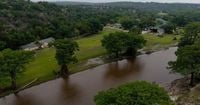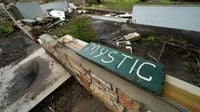As the sun rises over the Texas Hill Country, the landscape bears silent witness to a tragedy that shook hundreds of families and an entire community. Camp Mystic, the storied Christian girls’ summer camp along the Guadalupe River, announced this week that it will reopen next summer, less than a year after devastating floods claimed the lives of 27 young campers and staffers on July 4, 2025. The decision, announced in a pair of emails to families on Monday, has sparked both hope and heartache, reopening wounds that have yet to fully heal and igniting debate about safety, memory, and the meaning of moving forward.
According to The New York Times, the camp’s leadership first reached out to the families of the victims, pledging to honor new safety protocols and to build a memorial for those lost. About an hour later, a broader message went out to the rest of the camp community, expressing a determination to rebuild not just cabins and trails, but also the spirit of “laughter, friendship, and spiritual growth” that defined Camp Mystic for generations. “We look forward to welcoming you back inside the green gates,” the email read, echoing a sentiment that has comforted and divided the camp’s alumni and parents alike.
The reopening will take place at Camp Mystic Cypress Lake, a sister site that opened in 2020 and sits just over a hill from the original Guadalupe River campus. The latter, a 99-year-old institution deeply scarred by the floodwaters, is too damaged to open next summer. Plans are underway, however, to eventually rebuild, with the Eastland family—owners of Camp Mystic since the 1930s—stating they will “continue to evaluate” the future of the original site.
Yet, even as the camp prepares for its centennial in 2026, the shadow of the July 4 disaster looms large. The flooding, described as a catastrophic 1,000-year weather event, saw the Guadalupe River swell nearly 30 feet in a matter of hours, overwhelming cabins and sweeping away campers and staff as they slept. Survivors recall the terror of that night, when, as FOX Texas Digital reported, a flash-flood warning with “catastrophic” potential was issued at 1:14 a.m., too late for many to escape the rising waters. The tragedy was compounded by the fact that Camp Mystic was the only sleepaway camp along the river where campers died, even as other camps managed to evacuate in time.
The aftermath has been marked by grief, anger, and a fierce push for change. Parents of the victims, calling themselves “Heaven’s 27,” became leading advocates for new state legislation aimed at ensuring no family endures a similar loss. Their efforts resulted in the passage of the “Heaven’s 27 Safety Act” during a special session of the Texas Legislature. The suite of new laws prohibits the construction of cabins in floodplains, mandates detailed emergency preparedness plans, requires the installation of outdoor warning sirens, and allocates $240 million from the state’s rainy day fund for disaster relief, improved weather forecasting, and warning systems. As KHOU 11 News reported, these measures were designed to address the failures that contributed to the tragedy at Mystic and other camps in the region.
“Camp safety is now law in the great state of Texas,” Governor Greg Abbott declared at the bill signing in Austin, attended by dozens of grieving parents. The Eastland family, for their part, publicly supported the legislation, sending letters to lawmakers and affirming their commitment to “the creation of detection and warning systems that would have saved lives on July 4.”
But the path to reopening has not been smooth. The camp’s announcement of a memorial dedicated to the victims—intended as a place of reflection and remembrance—was met with immediate backlash from some families. “The families of deceased Camp Mystic campers and counselors were not consulted about and did not approve this memorial,” said Blake Bonner, father of nine-year-old Lila Bonner, in a statement to The New York Times on behalf of the bereaved families. Cici Steward, mother of eight-year-old Cile Steward, who remains missing, issued a searing response: “The truth is, Camp Mystic failed our daughters. Recovery teams are still out there, scouring the river, risking and sacrificing so much to find her so we can finally lay her to rest. For their efforts, we are eternally grateful. Camp Mystic, however, has only added to our grief.”
For these families, the camp’s communications have felt insufficient and, at times, insensitive. “For my family, these months have felt like an eternity. For the camp, it seems like nothing more than a brief pause before business as usual,” Steward’s statement continued. The ongoing search for Cile Steward has become a rallying point for many parents, who believe the camp’s resources should be focused on recovery efforts rather than reopening.
The Eastland family acknowledged the communication gap in their letter: “We have not been perfect at communicating. The distance that has grown between some of us saddens us all.” They emphasized their intention to honor the victims, stating, “In the memorial’s design, we will strive to capture the beauty, kindness, and grace they all shared, while focusing on the joy they carried and will always inspire in us all.”
Meanwhile, the Mystic community itself is divided. Many alumni and parents remain fiercely loyal to the camp, their bonds forged across generations. Some, including counselors who worked at Mystic this summer, have expressed concern that the new safety laws were rushed and could create an excessive financial burden for camp owners across Texas. In a letter to Governor Abbott, 11 counselors wrote, “There will be no future for Mystic and its surrounding camps. We want what is right for these girls that we miss so dearly while preserving the camp that we have always envisioned our babies attending, like our moms before us.”
The legislation is not without its critics. A petition circulated online urged the governor to veto the bills, arguing that the requirements—moving cabins, installing new warning systems, and retraining staff—would be prohibitively expensive for many camps, potentially forcing closures. Yet, for the parents of the lost, no price is too high to prevent another tragedy.
Camp Mystic’s reopening will be guided by the new laws. The camp promises safety orientations, emergency ladders, weather radios in each cabin, trained staff, and warning systems to alert all campers and staff in the event of danger. Camp leaders say they are “working with engineers and other experts to determine how we will implement the changes required” and pledge that no campers will return to cabins that had floodwaters inside them. The camp’s planning, they say, will reflect the lessons of the “catastrophic 1,000-year weather event” that changed everything.
As the community looks ahead to summer 2026, questions remain—about the night of the disaster, about the adequacy of past preparations, and about what true healing might look like. For some, the reopening of Camp Mystic is a testament to resilience and faith; for others, it is a painful reminder of all that was lost. But one thing is certain: the legacy of “Heaven’s 27” will shape the future of summer camps in Texas for generations to come.






